Related Research Articles
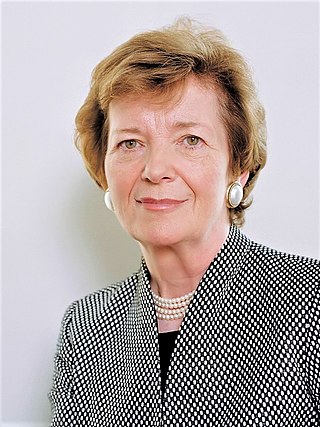
Mary Therese Winifred Robinson is an Irish politician who served as the seventh president of Ireland, holding the office from December 1990 to September 1997. She was the country's first female president. Robinson had previously served as a senator in Seanad Éireann from 1969 to 1989, and as a councillor on Dublin Corporation from 1979 to 1983. Although she had been briefly affiliated with the Labour Party during her time as a senator, she became the first independent candidate to win the presidency and the first not to have had the support of Fianna Fáil. Following her time as president, Robinson became the United Nations High Commissioner for Human Rights from 1997 to 2002.

The Taoiseach is the head of government or prime minister of Ireland. The office is appointed by the President of Ireland upon the nomination of Dáil Éireann and the office-holder must retain the support of a majority in the Dáil to remain in office.

Patrick John Hillery was an Irish Fianna Fáil politician who served as the sixth President of Ireland from December 1976 to December 1990. He also served as Vice-President of the European Commission and European Commissioner for Social Affairs from 1973 to 1976, Minister for External Affairs from 1969 to 1973, Minister for Labour from 1966 to 1969, Minister for Industry and Commerce from 1965 to 1969 and Minister for Education from 1959 to 1965. He served as a Teachta Dála (TD) for the Clare constituency from 1951 to 1973.
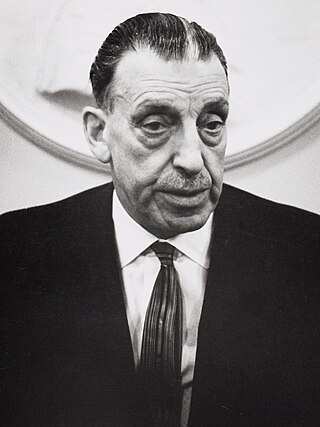
Seán Francis Lemass was an Irish Fianna Fáil politician who served as Taoiseach and Leader of Fianna Fáil from 1959 to 1966. He also served as Tánaiste from 1957 to 1959, 1951 to 1954 and 1945 to 1948, Minister for Industry and Commerce from 1957 to 1959, 1951 to 1954, 1945 to 1949 and 1932 to 1939 and Minister for Supplies from 1939 to 1945. He served as a Teachta Dála (TD) from 1924 to 1969.

John Gerard Bruton was an Irish Fine Gael politician who served as Taoiseach from 1994 to 1997 and Leader of Fine Gael from 1990 to 2001. He held cabinet positions between 1981 and 1987, including twice as minister for finance. He was Leader of the Opposition from 1990 to 1994 and 1997 to 2001. He served as a Teachta Dála (TD) for Meath from 1969 to 2004.

Brian Patrick Lenihan was an Irish Fianna Fáil politician who served as Tánaiste from 1987 to 1990, Minister for Defence from 1989 to 1990, Minister for Agriculture from March 1982 to December 1982, Minister for Fisheries from 1977 to 1979, Minister for Foreign Affairs from 1987 to 1989, 1979 to 1981 and January 1973 to March 1973, Minister for Transport and Power from 1969 to 1973, Minister for Education from 1968 to 1969, Minister for Justice from 1964 to 1969, Parliamentary Secretary to the Minister for Justice and Parliamentary Secretary to the Minister for Lands from 1961 to 1964. He served as a Teachta Dála (TD) from 1961 to 1973 and from 1977 to 1995. He served as a Senator for the Industrial and Commercial Panel from 1957 to 1961 and 1973 to 1977. He also served as a Member of the European Parliament (MEP) for the Oireachtas from 1973 to 1977.
Mary O'Rourke is an Irish former Fianna Fáil politician who served as Leader of the Seanad and Leader of Fianna Fáil in the Seanad from 2002 to 2007, Deputy leader of Fianna Fáil from 1994 to 2002, Minister for Public Enterprise from 1997 to 2002, Minister for Health from 1991 to 1992 and Minister for Education from 1987 to 1991. She also served as a Minister of State from 1992 to 1994. She served as a Teachta Dála (TD) from 1982 to 2002 and 2007 to 2011. She served as a Senator for the Cultural and Educational Panel from 1981 to 1982 and from 2002 to 2007, after being Nominated by the Taoiseach.

The 1965 Irish general election to the 18th Dáil was held on Wednesday, 7 April, following the dissolution of the 17th Dáil on 18 March by President Éamon de Valera on the request of Taoiseach Seán Lemass. The general election took place in 38 Dáil constituencies throughout Ireland for 144 seats in Dáil Éireann, the house of representatives of the Oireachtas. The governing Fianna Fáil saw a slight increase, though did not obtain a majority.
Events in the year 1963 in Ireland.
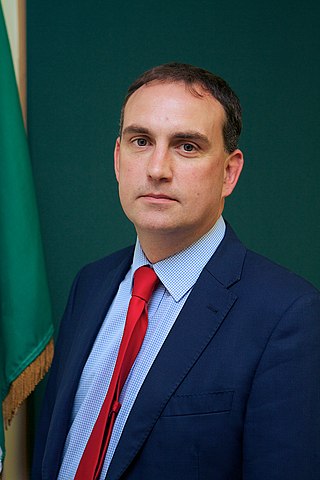
Marc MacSharry is an independent, formerly Fianna Fáil, politician who is a Teachta Dála (TD) for Sligo–Leitrim since 2016. From 2002 to 2016, he was a Fianna Fáil Senator on the Industrial and Commercial Panel. He resigned from Fianna Fáil's parliamentary party in September 2021, alleging double standards. He resigned his Fianna Fáil membership in November 2022, amid claims he had bullied colleagues.

Seán Haughey is an Irish Fianna Fáil politician who has been a Teachta Dála (TD) for the Dublin Bay North constituency since 2016, and previously from 1992 to 2011 for the Dublin North-Central constituency. He served as a Minister of State from 2006 to 2011 and Lord Mayor of Dublin from 1989 to 1990. He was a Senator for the Administrative Panel from 1987 to 1992.
Daniel Desmond was an Irish Labour Party politician and Teachta Dála (TD) for seventeen years.
Michael Butler Yeats was an Irish barrister and Fianna Fáil politician. He served two periods as a member of Seanad Éireann.
Edward Nealon was an Irish Fine Gael politician and journalist.
Comhairle na dTeachtaí was an Irish republican parliament established by opponents of the 1921 Anglo-Irish Treaty and the resulting Irish Free State, and viewed by republican legitimatists as a successor to the Second Dáil. Members were abstentionist from the Third Dáil established by the pro-Treaty faction. Just as the First Dáil established a parallel Irish Republic in opposition to the British Dublin Castle administration, so Comhairle na dTeachtaí attempted to establish a legitimatist government in opposition to the Provisional Government and Government of the Irish Free State established by the Third Dáil. This legitimatist government, called the Council of State, had Éamon de Valera as president. In 1926 de Valera resigned as president, left the Sinn Féin party and founded Fianna Fáil, which in 1927 entered the Fourth Dáil. Comhairle na dTeachtaí, never more than a symbolic body, was thereby rendered defunct.
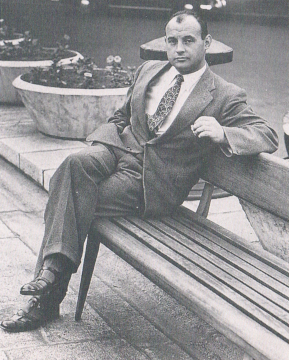
John McQuillan was an Irish politician, trade unionist and army officer.
Florence O'Mahony was an Irish politician. A member of the Labour Party, he was a senator in the 1980s, and was also a Member of the European Parliament (MEP).
Fianna Fáil was founded on 23 March 1926 when a group of Dáil deputies led by Éamon de Valera split from the original Sinn Féin. This happened because de Valera's motion calling for elected members be allowed to take their seats in the Dáil, if and when the controversial Oath of Allegiance was removed, failed to pass at the Sinn Féin Ard Fheis. The new party adopted its name on 2 April of the same year. From the formation of the first Fianna Fáil government on 9 March 1932 until the 2011 general election, the party was in power for 61 of 79 years. Its longest continuous period in office was 15 years and 11 months. Its single longest period out of office, in that time, has been four years and four months. All eight of its party's leaders have served as Taoiseach. It was the largest party in Dáil Éireann at every general election from the 1932 general election until the 2011 general election, when it suffered the worst defeat of a sitting government in the history of the Irish state.
John Kelly is an Irish former Labour Party politician who has served as a Senator for the Administrative Panel from 2011 to 2016.
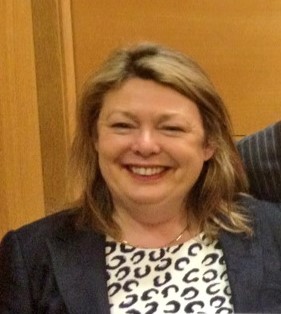
Aideen Hayden is an Irish former Labour Party politician who served as a Senator from 2011 to 2016, after being nominated by the Taoiseach.
References
- ↑ "John Horgan". Oireachtas Members Database. Archived from the original on 7 November 2018. Retrieved 6 February 2008.
- ↑ "Parnell to Pearse". University College Dublin Press. Retrieved 2 August 2018.
- ↑ The Long View Archived 15 July 2020 at the Wayback Machine The Irish Echo, October 2018.
- ↑ "Prof. John Horgan Confirmed as Ireland's First Press Ombudsman" (PDF). Office of the Press Ombudsman. 14 August 2007. Retrieved 6 February 2008.[ permanent dead link ]
- 1 2 Paul Cullen (15 August 2007). "State's First Press Ombudsman Appointed". The Irish Times . Archived from the original on 18 November 2010. Retrieved 6 February 2008.
- ↑ "John S Horgan". ElectionsIreland.org. Archived from the original on 21 February 2011. Retrieved 6 February 2008.
- ↑ Walker, Brian M., ed. (1992). Parliamentary Elections in Ireland 1918–1922. Dublin: Royal Irish Academy. ISBN 0-901714-96-8.
- ↑ "Ireland's First Press Ombudsman Named". RTÉ News . 14 August 2007. Archived from the original on 19 September 2007. Retrieved 14 August 2007.
- ↑ "Code of Practice for Newspapers and Periodicals". Office of the Press Ombudsman. Archived from the original on 4 June 2008. Retrieved 6 February 2008.
- ↑ Brian Hutton (3 January 2008). "New Press Watchdog Aims to Cut Costly Court Battles". Irish Independent . Archived from the original on 20 May 2011. Retrieved 6 February 2008.
- ↑ Fiach Kelly (10 January 2008). "Lenihan Puts Back Privacy Laws for Two Years". The Irish Independent. Archived from the original on 29 May 2008. Retrieved 6 February 2008.
- ↑ "Press Ombudsman to Retire". Irish Examiner . 28 March 2014. Archived from the original on 1 April 2014. Retrieved 28 March 2014.